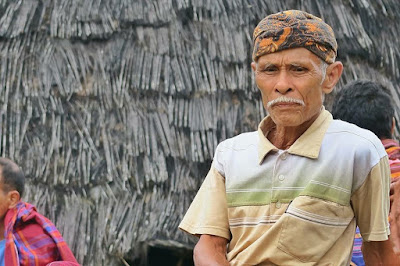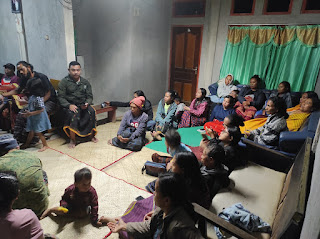Tutung Lilin Tradition
Right at the beginning of 2021, I
started my travel stories by visiting my hometown, the village where my parents
came from. The names are Wakos and Ntangis. Wakos is the village where my
father is from and Ntangis is the village where my mother came from. These
two villages are located in East Manggarai Regency, in a valley surrounded by a
row of hills north of the city of Borong, the capital of East Manggarai regency.
These two villages are close to each other, about 4 km away and only bordered by a fairly well-known river, Wae Bobo, which empties into the South Sea of Flores, namely the Sawu Sea.
With a
distance of about 50 km from the city of Ruteng and a travel time of about 2
hours, I rode a motorcycle that has accompanied my journey for years.
This trip was not an
ordinary trip, but more than that, a trip with the aim of praying at the
funeral of our ancestors which we often call in Manggarai "tutung
Lilin" or lighting a candle at a funeral.
For me and my family, this
tradition has been carried out every year with the aim of being grateful for
everything that was obtained in the previous year and hoping that luck and
health will continuously been given in the new year.
Rain accompanied almost the whole of my trip. Usually, motorbikes can ride through the village but because the road conditions at that time were very slippery, I parked my motorbike at Lamba village which is half an hours drive from Wakos.
 |
| Wakos Village |
The scenery along the way is very pleasing to the eye. The mountains and hills were getting greener and as for the slopes, there were rice fields with farmers who eagerly welcomed the water. Some plowed, prepared seeds, planted, and from a distance, I saw several huts with smoke on their roof.
I arrived at the hometown village, clothes half wet and quite tiring, but all the sorrows of this trip were gone with coffee, togetherness and the fire. Most of the people in the village worked in the rice fields. I was very thirsty and hungry, the first and foremost thing I did when I entered the house was to remove the cover of the pot that was still hanging behind the fire that had been left by Riska's mother who was busy planting rice in the rice fields far from home.
"Toe
manga ute", Riska said.
Vegetables has finished. “what is important there is black coffee and rice”, I replied.
Riska scooped up a plate of rice and served it with a glass of hot black coffee.
I invited Bapa Titus Wadur, my father's third younger brother. He was busy repairing the coffee grinder which often jammed due to age. He hurriedly left the equipment in his hands, then prepared himself to come with us to visit the graves of his father and mother.
Ari, sef, and Defri also came with us. They accompanied us on our way to the funeral. Lots of laughter and stories about the condition of the village decorated our trip .
Not just praying, we also started our activities by cleaning pests that thrived around the cemetery area. We lit the candles and before the traditional prayers were expressed, we prepared “rongko koli” or cigarettes made from rolls of dried palm leaves and betel nut to be served..
Bapa Titus began by inviting all the spirits of the ancestors to participate in the ritual. He mentioned one by one the names of the ancestors who were buried there.
Like meetings or conversations in the real life, Bapa Titus started talking to his father and mother, and his elder brother, he greeted and conveyed the purpose of our visit that afternoon
During his worship, Bapa
Titus explained the purpose of why we lit the candle at that time.
While holding betel nuts, Bapa Titus invited the spirits of his ancestors
to take part in the "teing hang" event which whould be
held in Ruteng, at my parents’ house on January 4.
After the ritual, my
brother Dion led a prayer with Catholic teachings to close our activities before
returning home.
Ntangis
After spending 2 days in
Wakos, I continued my journey to Ntangis. My younger brother Dion and I walked back to Lamba village, where my
motorbike was parked.
On the way back, we were
engrossed in recounting the ascending experiences we had during our time with
our family. Even though the meeting was very short, it was very valuable.
Dion said that “there were
many things that we can learn from people living in the village. In the midst
of their limitations, there is no electricity, no signal, no roads but they are
very happy to live their lives”. He also added that they are actually the most
successful people. Even though they live in the midst of their limitations, they managed to send their
children to school even to the university, what a great people they are! Dion ended his admire.
We really enjoyed the trip
until we finally arrived at the house where the motorbike was parked.
At that time there was no
one in the house, only a big duck that we finally thought he was the keeper of the
house.
That made sense because the
duck looked so tough and fierce to greet us. He was trying to block our way. But we
didn't lose any ideas. I tried to distract him while Dion ran to get the
motorbike.
I held a small stick made
of bamboo which I pulled out of the front fence of the house in case this large
duck attacked. He seemed not afraid. He chased me until he was finally tired
when I led him around the motorbike which was also parked beside the house.
A little funny and also
thrilling moment but in the end we were able to continue our journey to Ntangis
village to light a candle at the grave of my mother's ancestors.
Febri said that they had
just cleaned the graves a day after celebrating Christmas as a form of social
action when celebrating Christmas.
Without pulling up so much grass around the grave, we immediately lit candles and prayed in a catholic manner, which was again led by Dion.
Lighting a candle at the
grave gave more meaning to our journey in life. Apart from asking for prayers
that they will get eternal rest, but more than that, this moment is a moment to
remember someone who has played big role in life and is also a form of respect
for those who have passed away.





Komentar
As Manggaraian, we never separate our living souls with those who died. Tutung Lilin is just a way how we bridge to distance between ours and theirs. Thank you for sharing.
As Manggaraian, we never separate our living souls with those who died. Tutung Lilin is just a way how we bridge the distance between ours and theirs. Thank you for sharing.